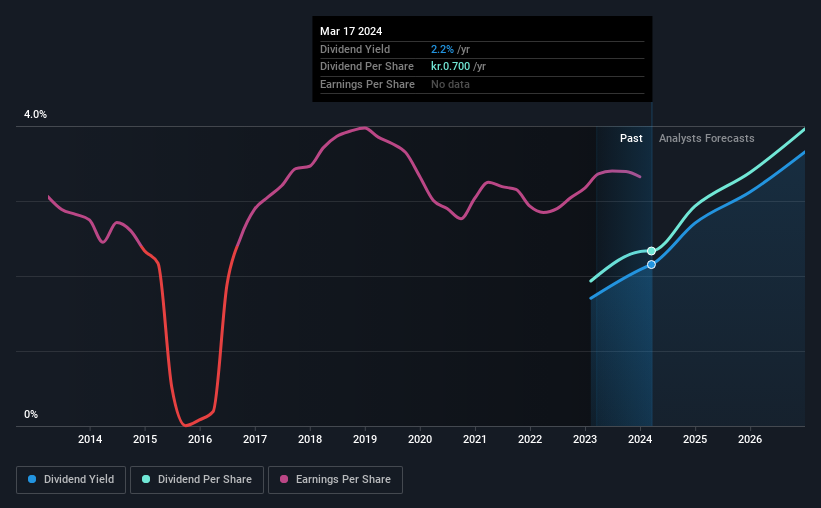Stock Analysis
Read This Before Considering H. Lundbeck A/S (CPH:HLUN B) For Its Upcoming kr.0.70 Dividend

H. Lundbeck A/S (CPH:HLUN B) stock is about to trade ex-dividend in 3 days. The ex-dividend date is one business day before the record date, which is the cut-off date for shareholders to be present on the company's books to be eligible for a dividend payment. The ex-dividend date is an important date to be aware of as any purchase of the stock made on or after this date might mean a late settlement that doesn't show on the record date. Thus, you can purchase H. Lundbeck's shares before the 21st of March in order to receive the dividend, which the company will pay on the 25th of March.
The company's upcoming dividend is kr.0.70 a share, following on from the last 12 months, when the company distributed a total of kr.0.70 per share to shareholders. Looking at the last 12 months of distributions, H. Lundbeck has a trailing yield of approximately 2.2% on its current stock price of kr.32.52. Dividends are a major contributor to investment returns for long term holders, but only if the dividend continues to be paid. As a result, readers should always check whether H. Lundbeck has been able to grow its dividends, or if the dividend might be cut.
View our latest analysis for H. Lundbeck
Dividends are typically paid from company earnings. If a company pays more in dividends than it earned in profit, then the dividend could be unsustainable. Fortunately H. Lundbeck's payout ratio is modest, at just 30% of profit. A useful secondary check can be to evaluate whether H. Lundbeck generated enough free cash flow to afford its dividend. Luckily it paid out just 16% of its free cash flow last year.
It's positive to see that H. Lundbeck's dividend is covered by both profits and cash flow, since this is generally a sign that the dividend is sustainable, and a lower payout ratio usually suggests a greater margin of safety before the dividend gets cut.
Click here to see the company's payout ratio, plus analyst estimates of its future dividends.

Have Earnings And Dividends Been Growing?
Companies with falling earnings are riskier for dividend shareholders. If earnings decline and the company is forced to cut its dividend, investors could watch the value of their investment go up in smoke. Readers will understand then, why we're concerned to see H. Lundbeck's earnings per share have dropped 10% a year over the past five years. Ultimately, when earnings per share decline, the size of the pie from which dividends can be paid, shrinks.
Given that H. Lundbeck has only been paying a dividend for a year, there's not much of a past history to draw insight from.
The Bottom Line
From a dividend perspective, should investors buy or avoid H. Lundbeck? Earnings per share are down meaningfully, although at least the company is paying out a low and conservative percentage of both its earnings and cash flow. It's definitely not great to see earnings falling, but at least there may be some buffer before the dividend needs to be cut. Overall, it's not a bad combination, but we feel that there are likely more attractive dividend prospects out there.
While it's tempting to invest in H. Lundbeck for the dividends alone, you should always be mindful of the risks involved. For example - H. Lundbeck has 1 warning sign we think you should be aware of.
A common investing mistake is buying the first interesting stock you see. Here you can find a full list of high-yield dividend stocks.
Valuation is complex, but we're helping make it simple.
Find out whether H. Lundbeck is potentially over or undervalued by checking out our comprehensive analysis, which includes fair value estimates, risks and warnings, dividends, insider transactions and financial health.
View the Free AnalysisHave feedback on this article? Concerned about the content? Get in touch with us directly. Alternatively, email editorial-team (at) simplywallst.com.
This article by Simply Wall St is general in nature. We provide commentary based on historical data and analyst forecasts only using an unbiased methodology and our articles are not intended to be financial advice. It does not constitute a recommendation to buy or sell any stock, and does not take account of your objectives, or your financial situation. We aim to bring you long-term focused analysis driven by fundamental data. Note that our analysis may not factor in the latest price-sensitive company announcements or qualitative material. Simply Wall St has no position in any stocks mentioned.
About CPSE:HLUN B
H. Lundbeck
H. Lundbeck A/S, a biopharmaceutical company, engages in the research, development, production, and sale of pharmaceuticals for the treatment of psychiatric and neurological disorders in Europe, United States, and internationally.
Undervalued with excellent balance sheet.

